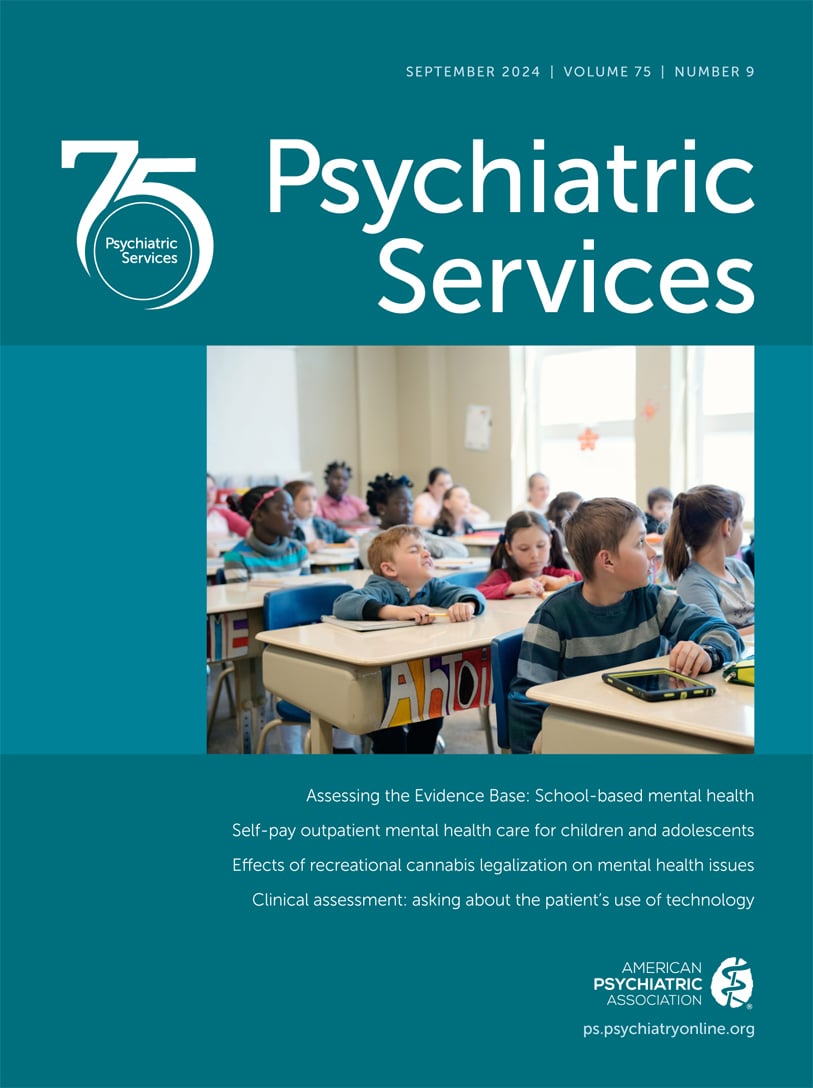Psychiatric Services
- Volume 67
- Number 12
- December 2016
Highlights
Taking Issue
Articles
Publication date: 15 August 2016
Pages1292–1299Objective: This study sought to describe the extent to which psychiatrists, prior to insurance expansions under the Affordable Care Act (ACA), reported currently participating or being likely to participate in integrated services delivery models, to assume ...
https://doi.org/10.1176/appi.ps.201500536Publication date: 01 July 2016
Pages1300–1306Objective: This study examined the adherence of psychiatrists to the Schedule of Recommended First and Second Line Antipsychotic Medications (“Antipsychotic Schedule”), which was implemented in two Recovery After an Initial Schizophrenia Episode (RAISE) ...
https://doi.org/10.1176/appi.ps.201500438Publication date: 15 July 2016
Pages1307–1314Objective: Antipsychotic use among young children has grown rapidly despite a lack of approval by the U.S. Food and Drug Administration (FDA) for broad use in this age group. Characteristics of physicians who prescribed antipsychotics to young children ...
https://doi.org/10.1176/appi.ps.201500224Publication date: 01 August 2016
Pages1315–1320Objective: In the German federal state of Baden-Wuerttemberg, involuntary medication of psychiatric inpatients was illegal during eight months from July 2012 until February 2013. The authors examined whether the number and duration of mechanical coercive ...
https://doi.org/10.1176/appi.ps.201500476Publication date: 01 July 2016
Pages1321–1327Objective: In 2006, a goal of reducing seclusion in Dutch hospitals by at least 10% each year was set. More than 100 reduction projects in 55 hospitals have been conducted, with €35 million in funding. This study evaluated the results. Methods: Data (2008 to ...
https://doi.org/10.1176/appi.ps.201500414Publication date: 15 July 2016
Pages1328–1333Objective: School-based health centers (SBHCs) reduce access barriers to mental health care and improve educational outcomes for youths. This qualitative study evaluated the innovations and challenges of a unique network of SBHCs in a large, urban school ...
https://doi.org/10.1176/appi.ps.201500401Publication date: 15 July 2016
Pages1334–1339Objective: Data on services use, characteristics, and geographic distribution of homeless individuals who died in Philadelphia from 2009 to 2011 provided perspective on assessments of the homeless population that rely on conventional counts and surveys. ...
https://doi.org/10.1176/appi.ps.201500388Publication date: 15 July 2016
Pages1340–1347Objective: Homeless adults make extensive use of emergency department (ED) services. This study examined factors associated with moderate and high ED use in a cohort of chronically homeless individuals. Methods: A cross-sectional analysis identified factors ...
https://doi.org/10.1176/appi.ps.201500526Publication date: 15 July 2016
Pages1348–1354Objective: This study examined the role of emergency department (ED) social workers and identified predictors of receipt of social work services and length of ED stay. Methods: Comprehensive reviews were conducted of medical records of all patients (N=49,354)...
https://doi.org/10.1176/appi.ps.201500469Publication date: 01 July 2016
Pages1355–1361Objective: Disseminating behavioral health (BH) research to elected policy makers is a priority, but little is known about how they use and seek research evidence. This exploratory study aimed to identify research dissemination preferences and research-...
https://doi.org/10.1176/appi.ps.201500443Publication date: 15 July 2016
Pages1362–1367Objective: Depression is pervasive and costly, and the majority of depression is treated in primary care. The objective of this study was to identify patient characteristics predictive of poor depression outcomes in primary care clinics. Methods: This ...
https://doi.org/10.1176/appi.ps.201400285Brief Reports
Publication date: 01 August 2016
Pages1370–1372Objective: In a pragmatic clinical trial, this study sought to compare relapses among patients receiving either long-acting injectable or oral second-generation antipsychotics. Methods: PROACTIVE (Preventing Relapse Oral Antipsychotics Compared to ...
https://doi.org/10.1176/appi.ps.201500466Publication date: 01 July 2016
Pages1373–1375Objective: Some advocates argue that the word “stigma” is itself stigmatizing and contributes to further denigration of people with mental illness. This brief report presents results of a nationwide survey comparing terminology related to stigma in regard ...
https://doi.org/10.1176/appi.ps.201500319Publication date: 01 August 2016
Pages1376–1379Objective: The objective of this study was to identify differences between men and women hospitalized for psychiatric conditions. Methods: Men and women with an inpatient psychiatric hospitalization in Ontario, Canada, between 2008 and 2013 (N=95,055) were ...
https://doi.org/10.1176/appi.ps.201500547Publication date: 01 July 2016
Pages1380–1383Objective: This study examined associations between sexual orientation of Asian-American women and receipt of mental health care and unmet need for health care. Methods: Computer-assisted self-interviews were conducted with 701 unmarried Chinese-, Korean-, ...
https://doi.org/10.1176/appi.ps.201500356Open Forum
Publication date: 15 July 2016
Pages1368–1369This Open Forum addresses the challenging situation involving decisions about when to hospitalize patients for psychiatric care. Because the evidence base for when to hospitalize patients is incomplete, current practice is to hospitalize only patients who ...
https://doi.org/10.1176/appi.ps.201500434Best Practices
Publication date: 01 September 2016
Pages1283–1285This column argues for the importance of patient-centered approaches in psychiatry and describes the development and pilot implementation, inspired by the Finnish Open Dialogue model, of a program designed to increase the “patient-centeredness” of an ...
https://doi.org/10.1176/appi.ps.201600340Research & Services Partnerships
Publication date: 03 October 2016
Pages1286–1289September 28, 2016, marked the 50th anniversary of the Connecticut Mental Health Center, a state-owned and state-operated joint venture between the state and Yale University built and sustained with federal, state, and university funds. Collaboration ...
https://doi.org/10.1176/appi.ps.201600373Personal Accounts
Appreciation to Reviewers
APA Achievement Awards
Letters
Book Reviews
News & Notes
Past Issues
View Issues Archive
Vol. 75 | No. 12

Vol. 75 | No. 11

Vol. 75 | No. 10
